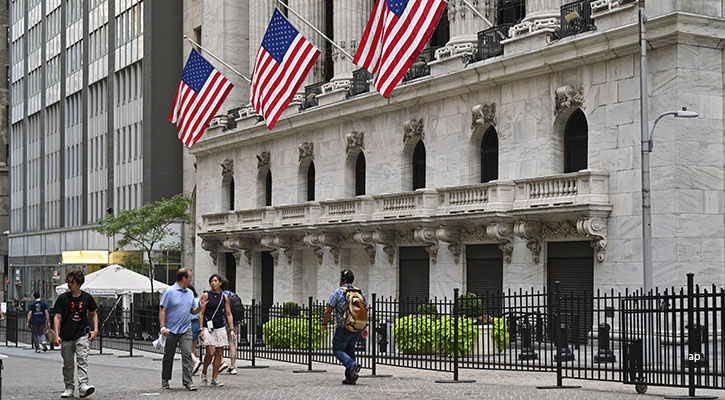
After a blockbuster start to the year, the “Magnificent Seven” stocks – the mega-cap tech companies that have driven the majority of the stock market’s gains since 2022 – have stumbled.
Rising interest rates are taking a bite out of their growth and investors’ confidence, but strategists say these giants could still provide a haven for investors amid an economic slowdown.
The Magnificent Seven stocks, which are Nvidia (NVDA), Tesla (TSLA), Meta Platforms (META), Apple (AAPL), Amazon.com (AMZN), Microsoft (MSFT), and Alphabet (GOOGL), surged in the first half of the year in large part thanks to enthusiasm surrounding artificial intelligence. They were collectively responsible for roughly two thirds of the Morningstar US Market index’s 20.6% returns, according to data from Morningstar Direct. Together, they were the largest contributors to those gains.
But it’s been a very different story since the beginning of August. All seven stocks are in the red since then, with the largest losses coming from Tesla, which has lost 23% after soaring 117% between January and July. The best performer since July has been Microsoft, which has only lost 2.2%.
These seven stocks are dragging the rest of the market down with them. Apple alone is responsible for nearly a full percentage point of the index’s 10% losses over the past three months. Together, the Magnificent Seven account for about a fourth of those losses. They’re a big reason the Morningstar U.S. Market Index closed out the past week in what is known as a correction, down 10% from this year’s July 31 high.
Rising Rates Put a Damper on Magnificent Seven′s Growth
A major factor driving that lacklustre performance is the recent runup in bond yields, which has accompanied unexpectedly resilient economic data and the market’s adjustment to the Federal Reserve’s “higher for longer” strategy on interest rates.
Morningstar chief US market strategist David Sekera points out that yields on the 10-year US Treasury note began to spike in July, right around the time the Magnificent Seven′s returns began to stagnate.
Higher rates can also drag on growth stocks because they make future earnings less valuable. “People are naturally nervous about growth companies when interest rates go up,” says Adam Grossman, global equity chief investment officer at RiverFront Investment Group.
This is especially true for longer-duration stocks like mega-cap tech companies. Rising rates also mean rising interest costs on corporate balance sheets, Grossman adds, which detracts from profitability, too. That’s adding to investors’ worries.
Magnificent Seven Valuation Swings
By the summer of 2023, valuations for the Magnificent Seven had become significantly less attractive compared with earlier in the year. That’s a big change from six months earlier, Sekera says, when six out of the seven stocks were undervalued according to Morningstar analysts.
Investors are less excited about expensive stocks, and that shift had a big impact on the Magnificent Seven’s momentum. By the end of July, “these stocks were no longer proving that tailwind to the market,” Sekera says.
“They got very expensive,” says Steve Sosnick, chief strategist at Interactive Brokers, meaning that there were very few investors who didn’t already have a position in those stocks. Sosnick says that change helped contribute to the stalled rally: “If you have very high valuations, it’s very hard to beat them.”
Today, Nvidia, Apple, Tesla, and Meta are rated 3 stars by Morningstar, meaning that they are trading at prices analysts consider fairly valued. Amazon, Microsoft, and Alphabet are rated 4 stars, meaning Morningstar analysts consider them to be undervalued.
The Stock Market’s Rally Failed to Broaden
Investors had hoped to see the market’s rally broaden out this year to include a wider swath of stocks, but that expansion has failed to materialise.
Sekera says rising yields have prompted some investors to reallocate larger portions of their portfolios to fixed income rather than other types of equities. Higher rates mean that fixed-income investments provide investors with attractive returns at significantly less risk compared with stocks, which was not the case when rates were at rock-bottom levels.
“For years, we’ve been talking about how there is no alternative [to stocks],” says Interactive’s Sosnick. But now, that alternative exists. “You can invest your money for 5% with no risk and essentially no volatility.”
That’s not to mention ongoing geopolitical risks and the prospect of slower economic growth over the next few quarters. “People want to hide out in those large-cap stocks because they expect they will hold up better during that downturn,” Sekera says.
RiverFront’s Grossman adds that moderating inflation readings will help other types of stocks – like value stocks and small-cap stocks – drive revenue growth, which in turn could help expand leadership in the market. “If we get there,” he says, “that’s how you’ll get your breadth.”
What’s Next for the Magnificent Seven?
Despite their high price tags, some of these stocks could still be a popular bet for investors. All seven are still in the green for the year, even with their recent stumbles. The best performer since the beginning of the year has been Nvidia, which is up 176%. The “worst” performer of the group is Apple, with gains of 29%.
Unlike smaller stocks and value stocks with smaller margins, mega-cap tech stocks have wiggle room to continue making profits even when rates are high. “They have to keep just doing what they’re doing,” Grossman says, “and not have their business models break under either higher interest rates or regulatory scrutiny.”
Sosnick adds that, unlike smaller firms, these companies are also less dependent on capital markets for loans.
Morningstar’s Sekera doesn’t expect Tesla, Amazon, or Meta to provide a significant tailwind to the market in the months to come, but he points to Microsoft’s strong third-quarter earnings report as attractive for investors. The company is a well-established name that’s still growing, he says. “They hit on all cylinders this past quarter.”











:quality(80)/cloudfront-us-east-1.images.arcpublishing.com/morningstar/347BSP2KJNBCLKVD7DGXSFLDLU.jpg)















